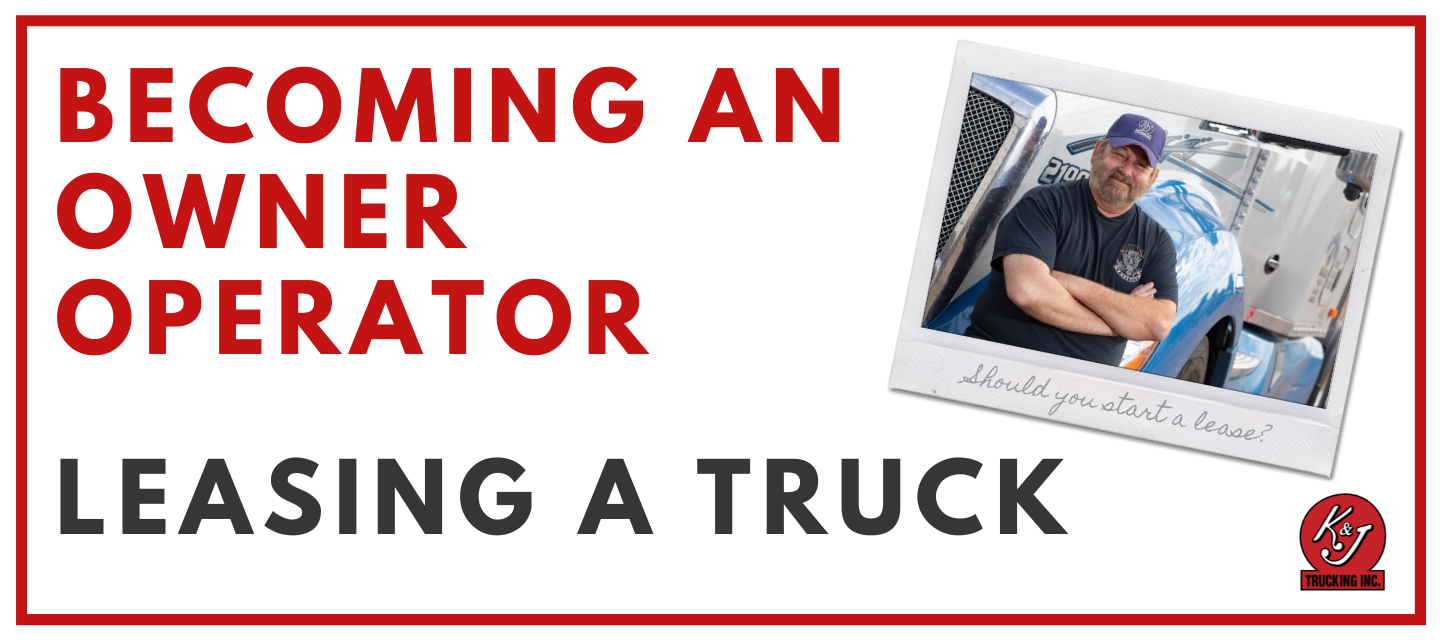Becoming an Owner-Operator: Leasing a Truck

Once you have found the right truck, you need to determine the right way to pay for it based on your own personal situation. As we discussed in our truck financing overview post, the two main options are purchasing or leasing. And which path you decide to take will depend on what is best for you and your long-term goals.
For example, maybe you have been struggling to qualify for a truck loan due to less than ideal credit scores. Or maybe you prefer smaller monthly payments that allow you to prepare for expenses like repairs or rising fuel prices. Or maybe you don’t have a large chunk of money set aside for a down payment. Leasing a truck is a great option that can allow you to get the equipment needed for your business and keep more money in your pocket.
Truck LEASE PROS
- Lease terms are often more flexible
- Lease periods are typically 36-48 months
- Little money down upfront
- Less strict credit requirements
- Smaller, more manageable monthly payments
- Usually have the option to buy the truck out at the end of the lease period
- Monthly payments are tax deductible
truck LEASE CONS
- Not building equity as fast as a purchase
- No depreciation write-off available
- May end up costing more than a loan in the end
- Mileage limits and overage charges
- Penalties for breaking a lease early
- Requirements to follow while you have the truck (read the fine print)
- Adhere to general wear and tear rules (i.e. return the truck in good condition)
truck LEASE TYPES
The leasing industry uses so many acronyms and the descriptions are often full of legal and tax jargon. This can make the process feel a bit daunting at first, so let’s break down the different types of leases available.
TRAC Lease
A TRAC (Terminal Rental Adjustment Clause) lease is an option where you can establish the residual value of the truck at the beginning of the lease term. When your lease period is over, you have three options: you may buy the truck at a predetermined residual value, return it to your lender, or refinance the truck at the residual value. If you choose to return the truck, and the value of the truck exceeds its predetermined residual value, you will receive the net proceeds. However, if the value of the truck falls below the predetermined residual value, you are responsible for paying the lender the difference.
This may seem like a gamble, but it provides many benefits to you while still offering the lender some protections against a volatile resale market.
For tax purposes, TRAC leases are considered capital leases and therefore will appear on your balance sheet as an asset (even though they are typically considered operating leases in regards to title holding).
In addition to the standard TRAC lease, there are additional TRAC configurations:
- Modified or Split TRAC lease offers some additional protection to lessees through reduced liability. If the value of the truck falls below the predetermined residual value at the end of the lease term, the maximum amount you owe your lessor will be capped. This can help protect you against volatility in the resale market. Differing from traditional TRAC leases, these leases are classified as operating leases for tax purposes and, as such, are considered a business expense, not an asset.
- Zero TRAC lease / Dollar Buyout Lease modifies the amortization schedule so that it zeroes out by the end of the lease, resulting in no residual and full ownership of the truck when the lease term is over. The only out-of-pocket costs that may remain are applicable sales tax, which varies by state.
Fair Market Value Lease
A very flexible option, a Fair Market Value lease gives you the option to either purchase the truck at its current fair market value (plus other amounts or fees that may be due under the lease terms) or simply return the truck (as long as it passes inspection, return conditions, and mileage restrictions). This lease option is similar to renting an apartment - you are paying to use the truck, but not building any equity ownership during the lease period.
Lease-to-Own with a Carrier
This option is exactly what it sounds like. You will make monthly payments to the company you work for and part of that payment will go towards the truck’s purchase price. At the end of the lease term, there will be a larger, final payment you will have to make and then the truck is yours. This lease-to-own program blends the advantages of leasing and purchasing, and serves as a way for truckers with credit issues to work toward ownership.
It is extremely important to do your research on the equipment and company with which you are considering leasing-to-own. There are certainly predatory companies looking to take advantage of new or naive owner operators through these types of programs. You also need to be honest about your capabilities as an owner operator. Some lease-to-own programs appeal to drivers who would like to become owner operators but do not yet have the business or driving experience to do so.
At K&J we are proud to have a non-predatory leasing program that gets you into a truck with manageable payments and low overhead, but not all carriers are looking out for the driver's best interest. Talk to other lease operators at your company before you pursue this option!
Understanding Lease Agreements
Regardless of which type of lease you choose, it is essential to make sure you understand all the terms of the agreement before you sign anything. If you need help understanding your lease contract, hire a professional to read and explain it to you. Better to pay someone to advise you now than to end up paying huge penalties later. And do not feel pressured into making a decision if you are not 100% comfortable with the agreement. If you find yourself with only one option - and that option is not great - you should reconsider purchasing a truck at this time.
The most important piece of advice we can give you is to connect with a financing company who cares enough about you to do what’s best for you and wants to make you successful. Do your research, compare lenders and their terms, and really get to know your potential business partner. At the end of the day, your truck is your primary asset and it is crucial to take the time to determine the best way to finance it based on what’s best for you.
If you are ready for a company that offers a great leasing option, please check us out! We would love to work with you!

